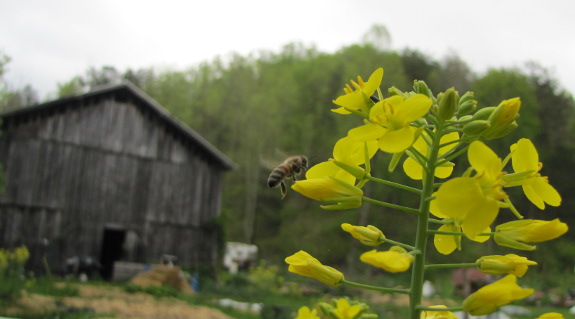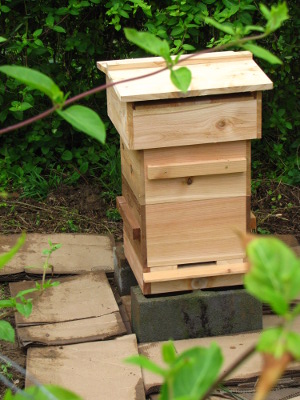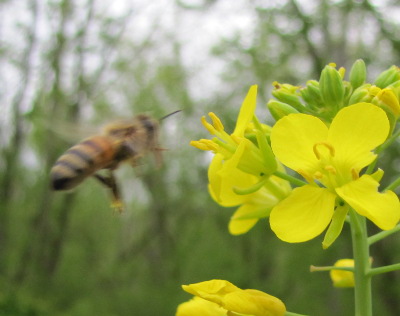
Is it safe to feed bees honey from a colony collapse disorder hive?

 If
all goes as planned, our two packages of chemical-free
bees should arrive
today. Next time, we're going to plan further ahead so we're not
putting the finishing touches on our hives the night before!
If
all goes as planned, our two packages of chemical-free
bees should arrive
today. Next time, we're going to plan further ahead so we're not
putting the finishing touches on our hives the night before!
We've still got one
major decision to make, and I'm hoping experienced beekeepers will
weigh in. New package bees have to be fed, and I've got quite a
bit of honey leftover from the
hives that died of colony collapse disorder last fall. But I can't decide if
it's safe to feed the honey to our new bees.
As a data point, our
neighbor's bees have been robbing those hives ever since our original
bees died. I should have just harvested the honey, but it's tough
to get honey out of the comb during cold weather, so I only took a bit
at a time. Alternatively I should have blocked off the hives, but
I never thought of it except when I saw the bees robbing, and I didn't
want to shut the workers in.
 80% of my neighbor's bees
died over the winter, and without an autopsy, the cause of death is
uncertain. Even if my neighbor's bees died of the same thing as
my bees, both apiaries could have come down with the problem
independently simply due to living in the same region. They might
have died of different things entirely. Or my honey might have
killed them.
80% of my neighbor's bees
died over the winter, and without an autopsy, the cause of death is
uncertain. Even if my neighbor's bees died of the same thing as
my bees, both apiaries could have come down with the problem
independently simply due to living in the same region. They might
have died of different things entirely. Or my honey might have
killed them.
So, my question to you
is --- which of the following would you feed new package bees:
- Sugar water just to play it safe (even though it's less nutritious)
- Honey from my dead hives (most of which is crystalized due to being extracted during cold weather)
- Honey-filled comb from my dead hives (which has the benefit of
containing pollen, but the disadvantage of being the most likely to
carry disease)
While you're at it, if
you want to tell me your favorite way of feeding bees in Warre and top bar hives, I'd appreciate it.
Thanks for your wisdom!
Want more in-depth information? Browse through our books.
Or explore more posts by date or by subject.
About us: Anna Hess and Mark Hamilton spent over a decade living self-sufficiently in the mountains of Virginia before moving north to start over from scratch in the foothills of Ohio. They've experimented with permaculture, no-till gardening, trailersteading, home-based microbusinesses and much more, writing about their adventures in both blogs and books.
Want to be notified when new comments are posted on this page? Click on the RSS button after you add a comment to subscribe to the comment feed, or simply check the box beside "email replies to me" while writing your comment.

I'd go a little further to say that I wouldn't feed bees honey from any other colony but their own, not only for the sake of keeping pesticides out of your new colony but spores, viruses, and anything else that might've gained purchase in a compromised hive. Refined white sugar is the best option, and it's not like it's a permanent - just until they start bringing in pollen.
Nice hives!!
P.S. I use a baggie feeder, a ½ gallon zip-lock in a shim just beneath the quilt. I've used a similar technique with my KTBH but had to place it on the floor of the hive. It ended up running out in the first night and drowned a few bees in the process. I didn't have much initial success with the horizontal long hives and need to revisit that style when I have a schedule that better permits for the time those require.
my post on feeding: http://bee-folk.dreamwidth.org/13996.html
Dean --- Thanks for chiming in! I think you're the most experienced beekeeper who comments on our blog, so I'll take your word as gospel.
(Actually, I'm not sure why I hadn't subscribed to your blog before this. I'll be reading now!)